 A 3-2 program commonly refers to a dual degree program in Engineering and Liberal Arts that is completed by attending two different institutions. Students spend their first three years attending a college without an engineering program, usually a Liberal Arts College. The last two years are completed at an institution with an engineering program and the student graduates with two bachelors degrees.
A 3-2 program commonly refers to a dual degree program in Engineering and Liberal Arts that is completed by attending two different institutions. Students spend their first three years attending a college without an engineering program, usually a Liberal Arts College. The last two years are completed at an institution with an engineering program and the student graduates with two bachelors degrees.
General
FAQ: What is a suitcase school?
 A suitcase school is college that is a predominately residential campus, unlike a commuter school, but where a significant percentage of students go home for the weekend. Suitcase schools tend to be less selective and have a majority of students who live in a close travel radius to the school.
A suitcase school is college that is a predominately residential campus, unlike a commuter school, but where a significant percentage of students go home for the weekend. Suitcase schools tend to be less selective and have a majority of students who live in a close travel radius to the school.
FAQ: What is the difference between an honors college and an honors program?
 An honors college is more likely to exist in large research university setting with many other existing colleges such as engineering, business, agricultural, natural sciences, etc. Honors programs tend to be at smaller institutions that don’t have college divisions or only two or three such colleges.
An honors college is more likely to exist in large research university setting with many other existing colleges such as engineering, business, agricultural, natural sciences, etc. Honors programs tend to be at smaller institutions that don’t have college divisions or only two or three such colleges.
Many honors colleges evolved from university honors programs. Becoming an honors college is important in terms of structure and funding at universities.
FAQ: How important are extracurricular activities in college admissions?
 Extracurricular activities are important as a secondary factor in the college admission process. According to a survey by the National Association for College Admission Counseling, Grades in College Prep Course, Strength of Curriculum, Tests Scores, and Grades in all Sources are more important in the admission decision than Extracurricular activities.
Extracurricular activities are important as a secondary factor in the college admission process. According to a survey by the National Association for College Admission Counseling, Grades in College Prep Course, Strength of Curriculum, Tests Scores, and Grades in all Sources are more important in the admission decision than Extracurricular activities.
FAQ: My high school doesn’t offer AP classes, will it hurt me in admissions?
 No. If your high school offers AP classes then taking AP classes demonstrates taking the most rigorous academic program available. If AP classes aren’t available, you can still take the most challenging academic program available, it just won’t include AP classes. AP courses help in college admissions only when high schools actually offer them. Colleges know what classes are available based on the school profile that is sent with counselors letter or transcript.
No. If your high school offers AP classes then taking AP classes demonstrates taking the most rigorous academic program available. If AP classes aren’t available, you can still take the most challenging academic program available, it just won’t include AP classes. AP courses help in college admissions only when high schools actually offer them. Colleges know what classes are available based on the school profile that is sent with counselors letter or transcript.
FAQ: What is the difference between early action and early decision?
 When considering early action vs. early decision, the major focus is on the fact that Early Decision (ED) is binding and Early Action (EA) is not. Binding means that if you are accepted, you agree to attend the college and withdraw or not apply to any other colleges. The reason to do so is that some of the most competitive colleges have much higher early decision acceptance rates. However, colleges where early decision acceptance rates are much higher than regular decision generally do not provide much in the way of merit aid. So students need to be prepared to pay their full Expect Family Contribution.
When considering early action vs. early decision, the major focus is on the fact that Early Decision (ED) is binding and Early Action (EA) is not. Binding means that if you are accepted, you agree to attend the college and withdraw or not apply to any other colleges. The reason to do so is that some of the most competitive colleges have much higher early decision acceptance rates. However, colleges where early decision acceptance rates are much higher than regular decision generally do not provide much in the way of merit aid. So students need to be prepared to pay their full Expect Family Contribution.





